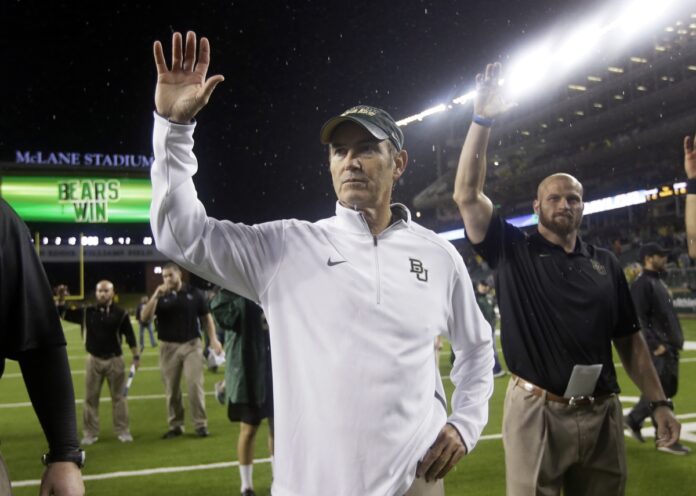College football boasts numerous remarkable qualities, yet the process of determining its champion isn’t among them.
Over the years, the sport has fumbled through the BCS era, and while some improvements have been made, they fall short of the mark that should be aimed for.
Declaring “it’s better than it used to be” lacks inspirational resonance, especially within an educational environment where young minds aspire to change the world for the better.
In the case of college football, an area in dire need of improvement remains conspicuously under the purview of the NCAA.
To truly ensure that the college football champion is the undisputed best, it must be proven on the field through a tournament format.
This format should encompass at least eight teams, where the outcome isn’t swayed by subjective opinions but solidified through competitive battles on the field.
The solution isn’t elusive; we need only look to the NFL’s well-established and effective playoff system as a blueprint to guide us in making the right choices for college football.
Selecting eight teams isn’t a mere shot in the dark. This number isn’t chosen simply because it’s the next step after four.
This choice is correct because it significantly diminishes the risk of excluding the eventual tournament champion from the pool of contenders.
Since the inception of playoff seeding in 1975, a staggering 92% of NFL Super Bowl victors have been seeded 4th or lower.
If they were part of a college playoff setup, most of these champions would have comfortably fit within an eight-team bracket.
However, if the bracket were restricted to just four teams, a noteworthy 23% of these NFL champions, who ultimately proved their superiority, wouldn’t have even made it to the tournament.
Maintaining an 8% margin of error over several decades is an acceptable tolerance level, especially considering the logistical challenges and time constraints faced by college programs and their student-athletes.
The substantial risk of being incorrect nearly a quarter of the time is not a chance we can afford to take. It’s time to make this change a reality.
The issues with the four-team playoff extend beyond just the potential for statistical errors.
In its inaugural year, the four-team playoff system declared five conferences as powerhouses on one hand while emphasizing the significance of conference championships for inclusion in the final bracket on the other.
Drawing upon my college education, it’s evident that five is more significant than four.
This simple arithmetic means that, at the very least, there will always be one conference champion left out of the equation unless the tournament expands to accommodate eight teams.
Failing to do so will likely lead to more situations like this one, as reported by ESPN:
“Baylor has hired a public relations firm to advocate for a spot in the playoff.”
Consider the implications of public relations firms lobbying for schools to secure a spot in a minuscule playoff pool. Take a moment to let that sink in.
The more you reflect on this statement, the more glaringly wrong it becomes. It’s almost ridiculous enough to warrant its own Jeopardy question:

The notion of resorting to a public relations firm to navigate this sporting landscape likely raises concerns among those with a genuine appreciation for sports.
It is a stark reminder that while the new four-team playoff system is a notable improvement over the perennially flawed BCS, it still has too many irrelevant elements that counter the spirit of actual competition.
True sportsmanship is demonstrated on the field; what happens there should remain confined to those grounds.
While it may sound like a worn-out saying, the ongoing disagreements surrounding this inaugural four-team playoff underline the complexity of establishing an objective ranking system that is ultimately subjective.
It’s a realm where the boundaries of the playing field are anything but clear-cut.
It’s increasingly evident that head-to-head matchups on the field are not being accorded the weight they deserve, considering the current rankings place 9-1 Baylor at 7th and 9-1 TCU at 5th, despite TCU’s lone loss being to Baylor.
This paradox challenges the very essence of fair competition.

At its essence, that doesn’t strike me as very “sportsmanlike.” When all else fails, it boils down to “who defeated whom?”—no need for a formal setting, as schoolyard rules have perpetually demonstrated their wisdom.
However, here lies the predicament. The factors under consideration by committee members are variable, with each person given the latitude to prioritize what they perceive as most significant subjectively.
This sort of common-sense approach from the schoolyard simply doesn’t apply.
Consider envisioning a baseball game scored in a dozen ways—some based on runner crossings, others on fly ball catches, others on total bases, strikes thrown, and so forth.
We don’t engage in such complexities in sports. In baseball, the team with the highest run count emerges victorious.
We pre-establish a set standard so all teams strive towards the same objective. Most crucially, we hit the field and engage in the game.
The issue with this subjective collage of quasi-objective criteria is that the playing field inevitably extends into the boardroom.
Opting for an eight-team playoff is the morally sound choice for college football.
This approach maintains the authenticity of the games, guaranteeing that the ultimate victor is genuinely the most likely best team, all while averting the need for the sport to succumb to undue influence.
Even before the first four-team playoff, it was evident that this setup was insufficient and likely to lead to substantial issues.
Until we embrace eight teams, there’s a significant likelihood that we’ll persist in making misguided decisions.

